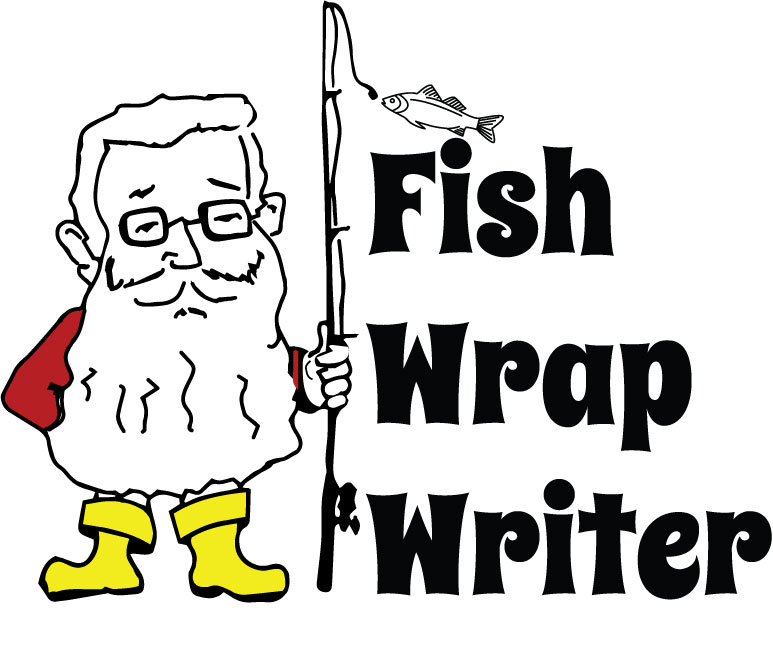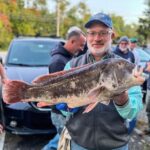Spring has been a hard sell so far. The poet Robert Hunter gave us, “Well the first days are the hardest days” and man was he right. Winter and now spring weather, among other factors, has caused construction of the Post Road dam fish ladder in Wakefield to be suspended. Snow melts and rains increased the amount of water pouring over the old granite wall so with alewives and bluebacks due to return very soon, all groups involved in this excellent and necessary project have agreed to hold off until buckies have arrived, spawned and out-migrated. Because this concerted effort is to protect and support such a critical forage fish’s annual migration, work cannot logically impede their movements nor does anyone want to create an unsafe work area.
According to RIDEM engineer Andres Aveledo, they will work with the existing Denil-style ladder and US Fish and Wildlife Service fish passage engineers to slow water flow and make its entrance easier to access for each new wave of fish by installing “a series of new baffles at the fishway exit to try and lessen the amount of water that has historically prevented fish from successfully passing upstream”. The contractor, Narragansett Dock Works, will move some rocks in an effort to coax incoming fish to the modified ladder and for fish who ignore the path, they will “do some channel modifications to direct fish that move upstream of the fishway entrance towards a resting pool near which we will dig near the entrance of the newly constructed fish ladder.” And that’s where the volunteers will step in.
Research by Christos D. Maravelias at the FRS Marine Laboratory in Scotland, showed how herring migrations are “affected by temperature and by currents” so with Chesapeake-area seawater temperatures in the very low forties, perhaps the buckies arrival will be delayed by a few weeks. What is exceptional about this whole process is that in the background are a whole line of folks willing to help move herring over that needless wall and that state agencies overseeing the construction are open to accommodating their efforts. To address safety, the contractor will install a temporary platform over the new walls and a walkway to reach it. At the risk of waxing philosophic, it’s bittersweet that we will be back moving fish with long nets and not watching for their flashes of silver in a muddy river or to see these beautiful fish glide past and beneath us under their own power. To see that is a bit of magic, really.
RIDEM Director Janet Coit has decided to reduce the 2015 season daily limit for striped bass to one fish per person. The culmination of a very public debate, this is a fine example of how a balanced system is supposed to absorb public comment, potential actions of neighboring states, our diverse financial needs and the significance of a particular stocks health. In this case, the sinking striped bass biomass, the importance of this fish to all sectors of fishermen and the need to arrive at a reasonable decision with an eye towards our collective future, Director Coit made it very clear in her statement that all groups of fishermen were given equal and serious consideration and that this rule is open to a future revision. The Director considered the opposition from the RI Marine Fisheries Council, who voted 5-3 to allow a conservation equivalency option, which would have favored the for-hire folks with a two fish per day allowance. With the exception of the unexceptional state of New Jersey, all coastal states have chosen the one fish rule, so our in-state charter and head boats will be at no regional disadvantage when it comes to luring in customers. Nice job, New Jersey.
Certainly as fishermen, who are often drawn to this sport or lifestyle because of our naturally competitive cave man genes, volunteering to cut back was not an easy decision but lots of us stepped up to the microphone or sat at the keyboard to say that this is the right time. This debate reminded me of old adage learned from a big guy named Tank, to “take from the past and apply it to the present in order to prepare for the future”. Although we may have strong differences in motivations and priorities, the decision has been made so our eyes should now be focused on poachers and boats from away which may try to circumvent our law. It’s too easy to quickly blame DEM Enforcement and no one wants to turn fishermen into narcs, but we also want this, unlike so many taxes, to be temporary. If you see it, make the call.
In the interest of clarity, for many weeks this column has voiced strong support to the one fish rule and no apologies are made for that. However, in making the case that for-hire captains and mates could also take two fish each, omitted was the fact that that was true for only one trip per day. Poor math on my part; mea culpa.
RIDEM will hold a workshop and hearing on Monday March 30 to discuss proposed amendments to state fishing regulations relating to tournaments and large organized fishing groups. The goal is to work with clubs and individual shore and boating fishermen to ensure access to waterways are not impeded since they can require more parking and access space. The workshop will start at 6:00 p.m., followed by the public hearing at 7:00 p.m. If you are not familiar with RIDEM’s new, more efficient way of disseminating information and voting on regulations, workshops are held before official hearings, saving you from having to pack a sandwich and blanket to go all the way to the Big City for a meeting and having to gas up and go back another night for the formal hearing. The downside is that if you don’t do your homework and show up unprepared, you may be forced to offer comment or cast a vote without enough time to digest all the possible consequences. The public workshop and hearing will be held in Room 300 at DEM Headquarters located at 235 Promenade Street in Providence.
Todd Corayer is a life-long fisherman who lives not far from the Saugatucket with his wife, who supports his fishing mainly to get him out of the house and a young son who regularly catches more fish than him.





0 Comments